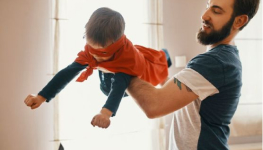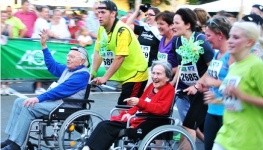Class of ParalympicsGB
Our interviewers are on a journey to learn more about ParalympicsGB athletes and their stories - asking questions in a way that only kids can.
Hannah Cockroft meets Elena and Ilaria | Part One
Twin sisters, Elena and Ilaria take the floor to quiz seven-time Paralympic champion, Hannah Cockroft.
Join us as they cover wheelchair racing, control and what it feels like winning and losing.
I'm Hannah Cockroft.
I am a wheelchair racer on the ParalympicsGB team.
Seven time Paralympic champion, 14 time world champion, 3 time European champion, one time Commonwealth champion, the World Records in the 100, 200, 400, 800 and 1500 metres on the track!
Class of ParalympicsGB!
Hello, My name's Elena.
I'm Ilaria.
I'm gonna be interviewing a Paralympian called Hannah Cockcroft with my twin sister.
Whenever someone meets us, they're like, “Oh, are you sisters?
” And we're like, “No, we’re twins” “You don’t look like twins!
” “We’re non-identical.
” That seems like every sentence is just that.
Feeling quite excited definitely, ‘cos it's not every day that you get to meet a Paralympian.
Is it easy to control your wheelchair?
It is now!
[Laughs] I've been doing this sport for a long time.
So you have the top handlebars that are kind of like your bike, grab onto them and they move your front wheel.
And then we have like a small triangular bar, underneath it.
It’s called your compensator and every track has a different size of bend.
So you have to set that and that will keep you in lane going round.
What does it feel like winning and losing?
Luckily, I've got a lot more experience winning than I have losing!
Losing is the worst feeling.
I'm not afraid to say that I love the glory of winning.
I like crossing that f-.
that's the fun part of racing, right?
Yeah!
You wanna cross first!
But winning.
It's not like the instant excitement that you might think it is.
For me now, winning is relief.
It’s going - “Phew.
I did it.
I'm still on top.
I’ve won!
” Is it quite hard to actually fall off the wheelchair or fall with the wheelchair?
It is and it isn't.
Like.
You can’t sit up like this in a race chair because the centre of gravity is different.
So you would just tip backwards.
So you have to stay leant forward all the time and you’re gonna keep all 3 wheels on the floor.
In a race - quite easy!
People are not afraid to hit your compensator, or touch your brake and the slightest clip of a wheel can flip the whole chair.
So there's been some amazing crashes!
Are you going to be competing in the Paris Paralympics this year?
I hope so!
That's the plan.
Selection happens in the first week of July, I think.
But my plan is definitely to be in Paris!
[Laughs]
Hannah Cockroft meets Elena and Ilaria | Part Two
Join us for Part two of our Class of ParalympicsGB as Elena and Ilaria continue to quiz wheelchair racer, Hannah Cockrocft.
The sisters speak with Hannah about her sporting inspirations and see one of her many Paralympic medals.
Everyone ready?
Ready?
Do either of you wanna see my medal?
You can say, “No.
” I won't be offended.
I think they are quite nice Do you want to hold it?
Wow!
That's really cool.
And it's not even on one level it’s like.
To replicate like a fan.
Theres all like different patterns on it.
So one of them is like a cherry blossom.
They all have different segments that represent different parts of Japan.
That's really cool.
Really cool!
Class of ParalympicsGB Who inspired you to take up wheelchair racing?
I think I was inspired to get into sport just by my family.
My younger brother is a really keen rugby player, So, I used to go and watch him, play his matches, play his games and always just wonder what what it felt like to be part of a team and what it felt like to do that.
Because growing up with a disability, it wasn't something that you could easily access and go and be part of.
Right, were going to do a little warm up We’re not pretending that’s your sister are we?
Pretty good!
I started playing sports with wheelchair basketball, so I got up to the GB’s women team.
I always played on my local team as well, so I was always the only girl in the national leagues.
And then got the invite to the women's team at the same time that I got invited to wheelchair racing British team.
So I had to make a decision at that point which way I wanted to go.
And I chose wheelchair racing.
But actually before I did wheelchair racing I competed in the discus as well.
So that was my first athletics sport and I represented Yorkshire my home county, and I won a silver medal at the school games in that.
What is your most embarrassing moment on the track?
Oh!
I had one.
We were doing a team training session and.
I had my head down and I was pushing in my lane and I didn't realise that someone had put a hurdle in my lane.
So kind of went through the hurdle and got stuck in it!
No one came to help me.
Everyone just sat and laughed at me!
Which wasn't that nice when I was laying on my back with a hurdle everywhere!
Also wasn't that comfortable!
[Laughs]
Dave Clarke meets Josh and Zach | Part One
You don't want to miss this one. Zach and Josh return to interview ParalympicsGB CEO and retired blind footballer, Dave Clarke.
The twins speak with Dave about everything from blind football, his favourite goal he scored and the importance of communication in sport.
I scored 128 in 144 games.
That's quite a lot, I guess.
Class of ParalympicsGB!
Out of all the sports in the world, Why did you choose football?
Well, I was born into a family of football fanatics.
Big Liverpool fans.
I hear a little rumour that you might support Manchester United, so we won't talk about that today.
The challenge for me as a kid was it wasn't possible to play football for your school, for your county, never mind your country.
But I was very fortunate to meet some amazing teachers and amazing coaches who made it possible.
What would you say the best goal is that you’ve ever scored?
There was the goal I scored against Spain at the Paralympics in 2012, where I beat three players and then I noticed the ball was on my right foot and I'm left footed normally, but I struck it across the goalkeeper and it went in the back of the net and I got so excited.
I hugged the first person I came to, which unfortunately was the referee!
Ready?
Yeah!
You’ve gotta listen out for that sound [Ball jangling] Eyes closed!
Shout him where you are.
Here Josh, in front of ya!
[Ball jangling] How do you know where the goal is and how do you know where to pass to?
Communication is really important in blind football.
The goalkeeper is fully sighted and the four outfield players are totally blind.
So it's really important that the information given by the goalkeeper to the defensive team and the guide behind the goal is really precise, really clear.
And then there's something called spatial awareness, and that is about being able to understand through echo recognition where you are on the pitch.
The football pitch in blind football has boards down the side, is 20 metres wide, it's 40 metres long, but the boards give an echo.
So I'm able to tell how far I'm away just by listening.
When you play why do you wear a blindfold?
Well, some people have light perception, and that can mean that they're able to get an idea where the ball is just from the shadow.
So to ensure that everybody's on the level and everybody has no sight at all, the blindfolds are put on.
When did you retire from football and become a CEO?
I actually retired from football in 2012 after the last game against Turkey and actually I scored with two minutes to go and then I ran around the pitch, not touching the ball deliberately so that I could stupidly say that that was my last ever touch in my career was scoring a goal!
Pass it into me.
[Ball jangling] [Powerful kick] Oh my God!
Thanks Dave for joining us.
Um.
yeah!
Thank you for telling us about yourself.
And.
hope you have a good day!
It's been great chatting to you boys, it really has.
And keep playing sport!
Thank you
Dave Clarke meets Josh and Zach | Part Two
Join us for Part two as our Class of ParalympicsGB members Zach and Josh continue to quiz ParalympicsGB CEO and retired blind footballer, Dave Clarke.
Our twins speak with Dave about his journey through sport and disability, dream jobs, career highlights and with a guest appearance from Bernie the guide dog.
Hi.
My name’s Josh and I'm going to be interviewing David Clarke.
with my brother Zach!
He used to play football, I think like 12 years ago.
So quite a long time ago.
My name's Dave Clark and I am the chief executive officer at ParalympicsGB.
What do you want to be when you grow up?
Actor.
An actor - oh yeah.
or a footballer!
Well these days - they’re often both, aren't they?
Especially when they're tripping over in the penalty area!
Class of ParalympicsGB!
So what do you do as the CEO of ParalympicsGB?
Well, it's my job - and I would say it's my dream job, to be honest, to help get the best prepared team to the Paralympic Games and also to ensure that what the team achieves at the Paralympic Games helps change society in a positive way for disabled people.
What’s your guide dog's name and how old is he?
So this is Bernie.
Bernie's two.
He has been a guide dog for three months now, so he's very new to it, but I think he's enjoying it.
Normally, Labradors are very keen on their food, and I can tell you when I come down in the morning, he's bouncing around wanting food.
But as soon as this harness goes on him, he's absolutely professional in what he does, he's brilliant.
Rattle that ball for me.
[Ball jangling] Superb!
Can we go faster?
Can we go faster?
Yes!
Look at this!
What was it like to grow up like.
.
.
as blind?
When I was born in 1970, the world was a very different place.
People's attitudes towards blindness, towards disability were very, very different.
So things like they would talk to my mum rather than talk to me.
And there were lots of ways in which it was seen as a problem.
But I was very fortunate to go to two great schools, primary and secondary.
I learned to read braille, I learned to do maths and English and I got the opportunity to do sports and I was able to go to university and go on into employment.
You mentioned that you learned braille, was it challenging?
Well, it's no different in a way to learning how to read.
But the great thing about braille is it's quite logical.
So once you've learned the letters A to J, then if you add one extra dot to those letters, it also becomes K to T.
it also becomes K to T.
After that, you are two dots to it, and the only one you have to do differently is W because braille was originally made in French and W doesn't get used.
What was the highlight.
like the main part of your career.
like the best thing that happened - during your career?
The opening ceremony of the London 2012 Paralympics.
I got asked to receive the torch in the stadium from Joe Townsend and I ran across the stadium and handed it to Britain's first ever gold medal winner in the Paralympics, Margaret Maughan.
The heat came out of the cauldron and the games were open and it was just a wonderful, wonderful event that I will never, ever forget, as long as I live.
Martin Sinclair meets Cooper and Jasper | Part One
Brothers, Cooper and Jasper are joined by retired ParalympicsGB Footballer, Martin Sinclair.
Join us as they learn more about his journey through sport, disability and his experience at the London 2012 Paralympic Games with his brother.
Martin Sinclair meets Cooper and Jasper | Part Two
In Part two of our Class of ParalympicsGB, Cooper and Jasper continue to quiz retired ParalympicsGB Footballer, Martin Sinclair.
The brothers speak with Martin about everything from his disability, role models to lessons he’s learned while competing.
We are #TeamHealth
Follow two people on very different but equally important personal health journeys – both supported by Bupa over 12 months.
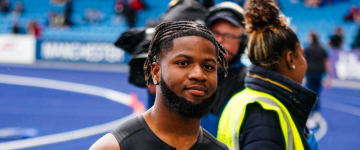
Emmanuel’s story
Emmanuel is a hopeful Paralympian faced with occasional self-doubt. Follow his quest to beat his personal best and find out if he made it to Paris 2024.
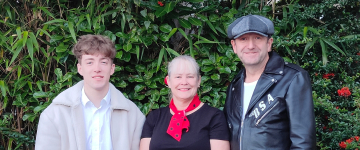
Julie’s story
After years of struggling with her weight, Julie decided to put her health first. Follow her journey from diet changes to finally fitting into her dream dress.
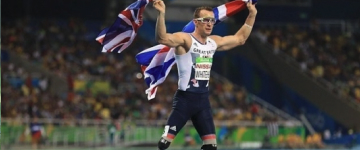
Meet their mentor, Richard
From Paralympic gold in 2012 to breaking records at Tokyo 2020, Richard Whitehead MBE is a decorated athlete – and now he’s helping others.
Start your own journey
Our health experts and ParalympicsGB athletes are here to help support your journey to a healthier, happier you.




